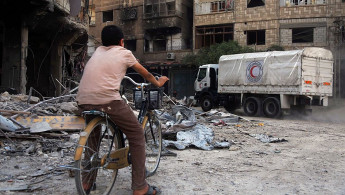Follow us on Facebook, Twitter and Instagram to stay connected
Syrians alarmed at Russia push to limit cross-border aid following veto
Displaced Syrians relying on humanitarian assistance voiced alarm Thursday after regime ally Russia tried to reduce cross-border aid to millions in the northwest of the war-torn country.
The Russian motion at the UN Security Council was voted down, but a council resolution authorising aid deliveries through the Turkish border expires Friday.
In a displacement camp in the last major opposition bastion of Idlib, father-of-four Abu Salem said living without aid was unthinkable for many who had lost their homes in the nine-year war.
"Why would they cut it off?" said the 48-year-old, in a tent near the town of Maaret Misrin in Idlib province.
"There are people in need. They've left their homes and everything in the world to come and live in a plastic tent without even a fan."
An estimated 2.8 million people depend on aid in northwest Syria, the United Nations says, including in Idlib.
The aid has so far come through two crossing points on the Turkish border: Bab al-Salam, which leads to the Aleppo region, and Bab al-Hawa, which serves the Idlib region.
|
Russia and China on Tuesday vetoed a one-year extension of the deliveries.
Moscow instead sought to abolish the first crossing and put a time limit of six months on the second, but that proposal was voted down on Wednesday.
Ibrahim Husrum, 24, said he was not surprised by Russia's latest veto after years of Russian war planes backing the Damascus regime against rebels and jihadists, including in Idlib.
"The Russians displaced us from our homes, bombarded us, and killed us," said the father of two young boys.
"Now they've moved on to the aid we receive," he said.
Amnesty International's Sherine Tadros said it was "impossible to overstate the importance of ensuring the crossing points, delivering vital aid, stay open".
"For millions of Syrians, it is the difference between having food to eat and starving," she said.
Syria's war has killed more than 380,000 people and displaced millions since first starting in 2011 with the repression of anti-government protests.





 Follow the Middle East's top stories in English at The New Arab on Google News
Follow the Middle East's top stories in English at The New Arab on Google News
![Both Hamas and the Palestinian Authority welcomed the ICC arrest warrants [Getty]](/sites/default/files/styles/image_330x185/public/2024-11/GettyImages-2178351173.jpg?h=199d8c1f&itok=TV858iVg)

